- Category
- Life in Ukraine
What These War Veterans Are Doing on Ukraine’s Basketball Courts Will Change How You See Disability
Cheerleaders, entertainers, and hundreds of fans gathered to cheer on players competing for gold at the first-ever All-Ukrainian Wheelchair Basketball Tournament for veterans. On the court, skill, talent, and fierce competition give new insight into what life with a disability can look like.
The Bolt pulls up to the Veneto sports complex in a residential Kyiv neighborhood—the lot is packed with cars, and cheers echo outside before entering the building. Once inside, a smiling woman greets me and hands me a postcard from Come Back Alive , one of the tournament’s organizers, alongside the Veterans Affairs Ministry and a global tech company, EPAM. On the front, two players reach for the ball; on the back, a quote reads:
When you’re part of a team, you feel a brotherly unity, you feel that you’re not alone, and that something depends on you.
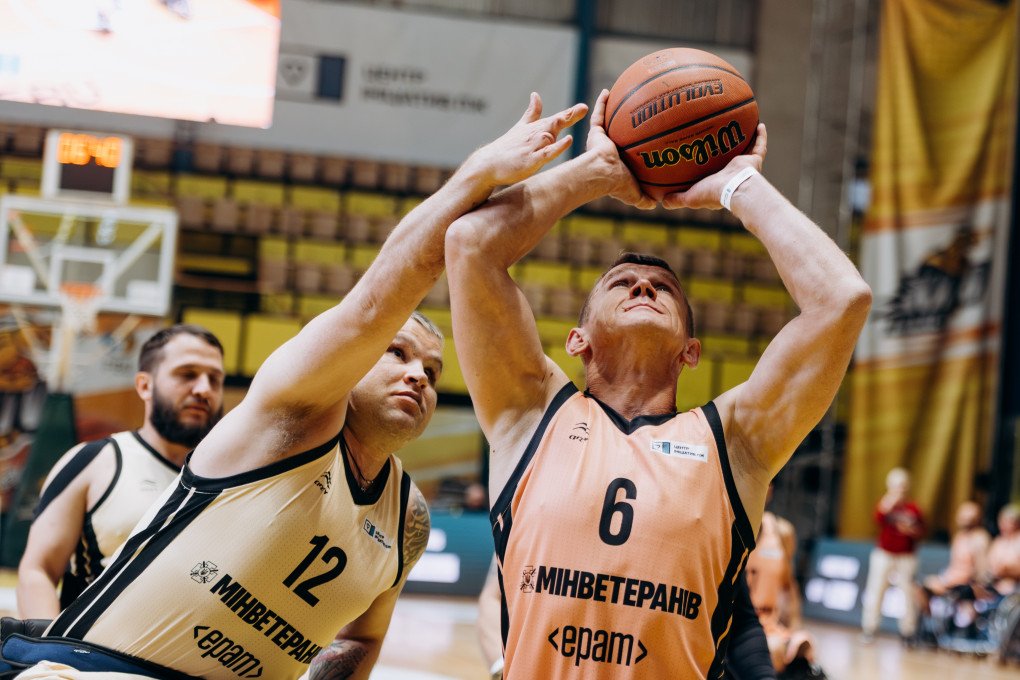
That feeling of unity and connection is immediately palpable as two teams battle it out on the court to the backdrop of high-energy 2000s hits. I take a seat in the second row and am instantly drawn into the game. At that moment, the Lviv Titans are competing against Loki and have the advantage on the court. Almost immediately, the Titans score again, and the crowd goes wild with applause, followed by an enthusiastic MC announcing their newest victory. A few moments later, the Titans score once more with a bank shot, securing their lead 16-6 with only 1 minute remaining in the 3rd period.
The Titans and Loki are just two of eight teams, totaling 66 players (25 of whom were introduced to wheelchair basketball only five days before the tournament), vying for the championship title. Ultimately, the Titans’ competitiveness and daring moves on the court will land them as runners-up, taking home the silver medal.
@united24media.com Lviv Titans compete against Loki at the All-Ukrainian Wheelchair Basketball Tournament for veterans; Titans’ co-founder, vice president, and captain, Pavlo Kozak (known as Pasha Champion on social media), scores. When not on the court, Champion is a motivational speaker, powerlifter, and bodybuilder. Video: Maria Kuchapska
♬ DESTRUCTION - SCXR SOUL & NONTHENSE
Wheelchair basketball 101
Throughout the playoff series, sportsmanship and camaraderie take center stage as players from opposing teams joke around with one another and help each other get back into their chairs after tumbles. Still, as with any sport, players challenge some of the ref’s calls.
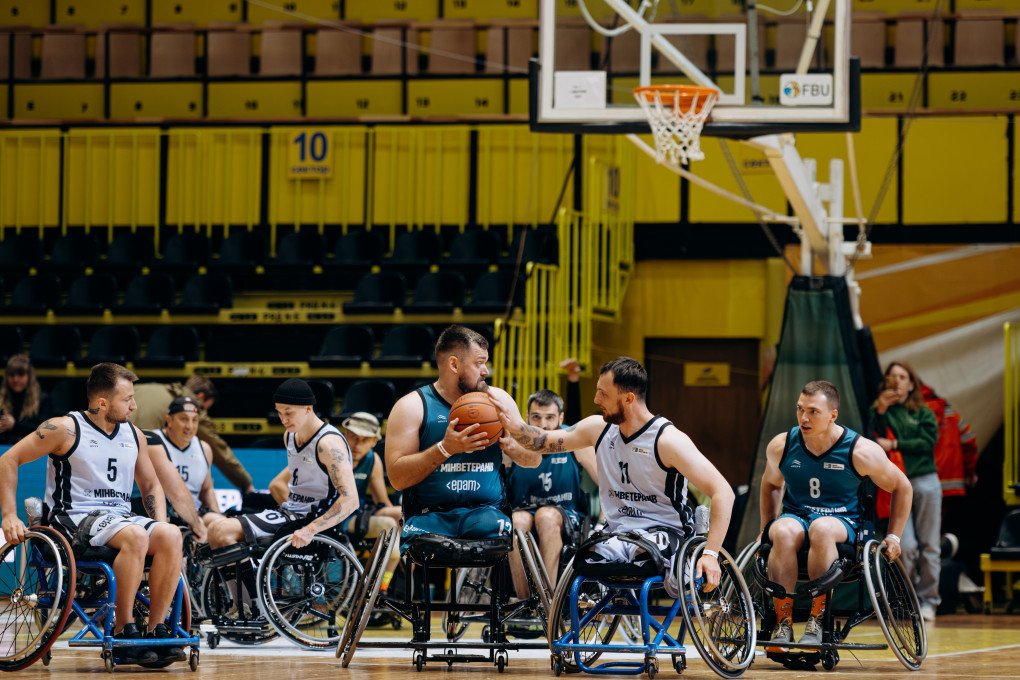
The rules of wheelchair basketball are not much different from those in the standing game, with a handful of adaptations. Scoring remains the same in both wheelchair and standing basketball:
Free throw = 1 point
Field goal inside the three-point line = 2 points
Field goal beyond the three-point line = 3 points
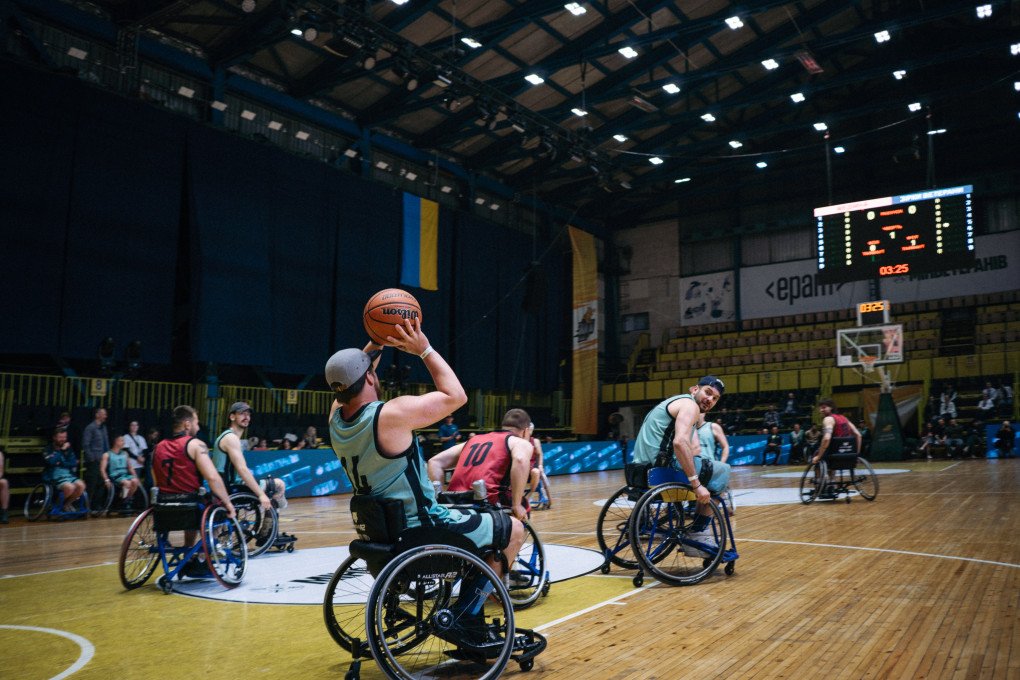
The International Wheelchair Basketball Federation guidelines say that the key differences come down to traveling the court and fouls:
After every two pushes, the player must either pass, shoot, or dribble again to avoid a traveling violation.
There is no double-dribble rule, meaning players can stop and restart dribbling without penalty.
The wheelchair is considered part of the player’s body, so all contact rules apply to the wheelchair.
Technical Fouls include: lifting legs to gain an advantage, lifting out of the chair
Players must remain seated and cannot use their legs or feet on the floor to steer the wheelchair.
A player who commits five personal fouls must be replaced by another player.
Even without knowing any of the rules, the atmosphere and energy compel the audience’s constant attention, as teams race the length of the court fighting for the perfect shot.
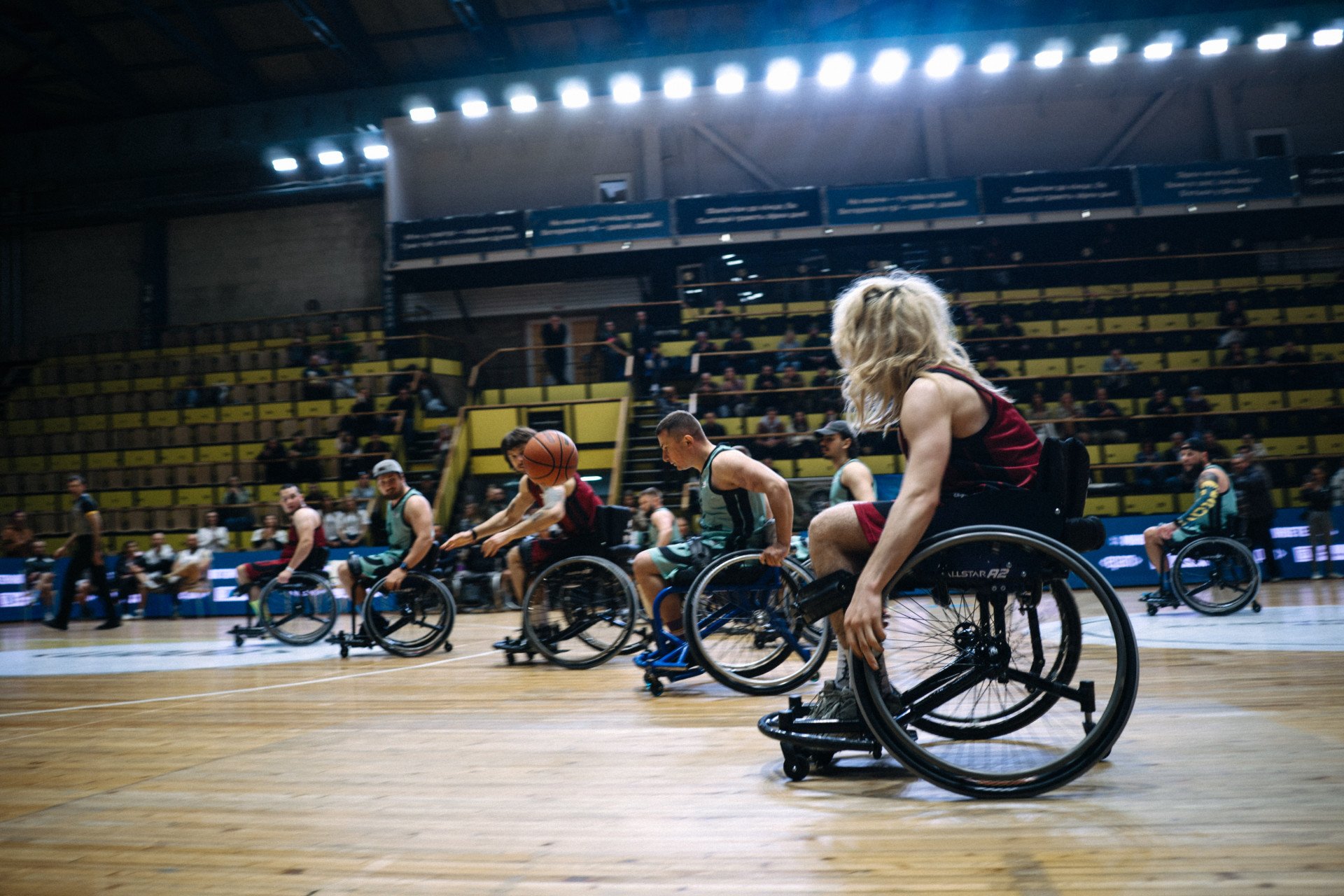
From the battlefield to the basketball arena
One of the players on the Vilni Voyiny (Free Warriors) team, Oleksii Prytula—an Odesa-based veterinarian turned veteran turned veterinarian again after completing rehabilitation, says that the games filled him with total joy. Prytula, who lost both legs, one above the knee and the other below the knee, in 2022 during the Lyman offensive, had never played basketball outside of the schoolyard or been particularly interested in it prior to his injury.
“All the jobs I had before were desk jobs—working with either animals or paperwork,” he says. “Sport didn’t have a big place in my life, outside of the occasional gym visit. I didn’t even watch games on TV.”
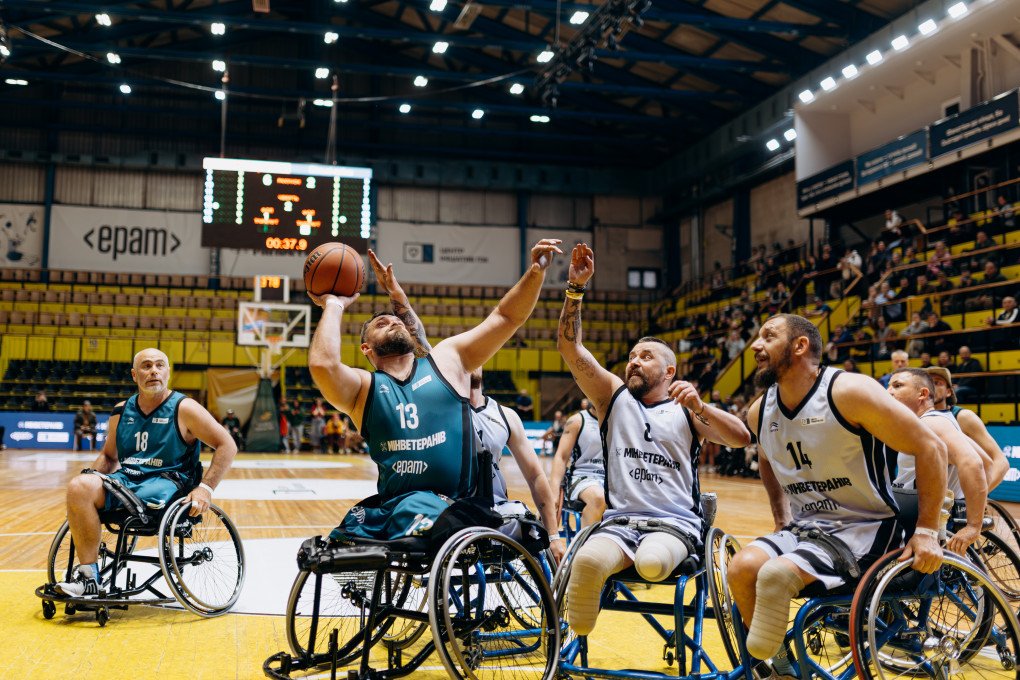
When you lose something, you start to feel like you’ve also lost all the opportunities you never acted on before.
Oleksii Prytula
Ukrainian veteran
“Fuck, I had legs and never ran, never played soccer or basketball,” he says. “With time, you decide why not, let's try, and you discover that it’s exactly the same sport, but just a little different—with the same drive and same charge, maybe even more [than standing basketball].”
Now, he says, “it’s just wow! It’s very cool, very dynamic. In a way, it compensates for all the things that I didn’t do before.” In the last year, Prytula says he’s participated in more sports than in the previous 44 years combined.
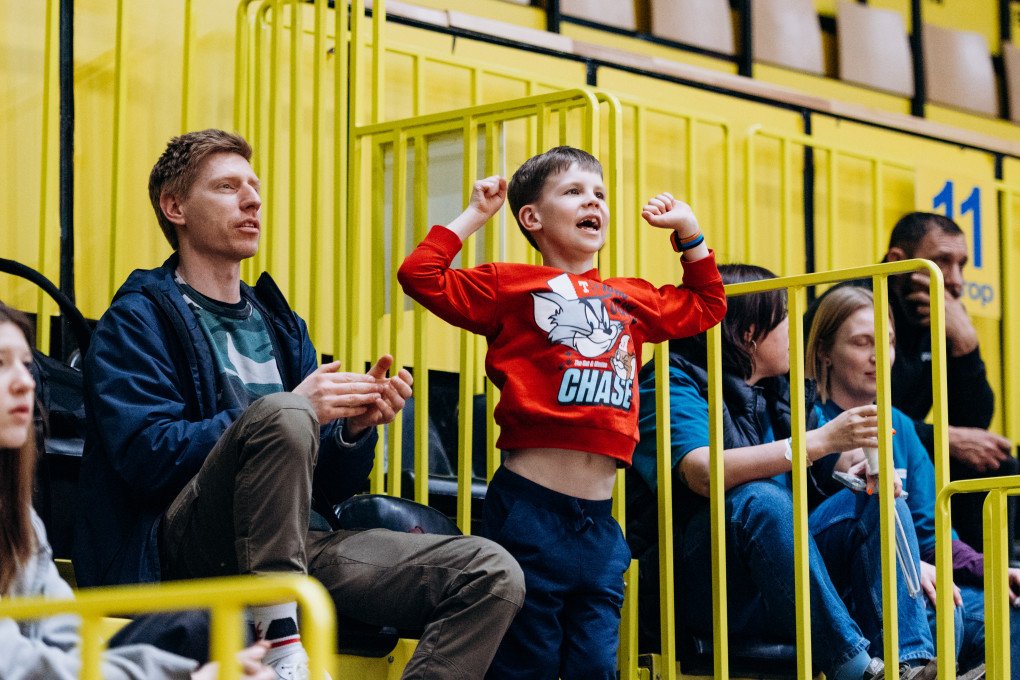
Talking about the CBA tournament in particular, Prytula was very impressed. Like the postcard, he also speaks about overarching feelings of unity and brotherhood on the court: “It’s very cool for me to be surrounded by people in the same situation—people who have also experienced war and injuries—because this is a comfortable environment for me. The fact that we get to do this together—well, that’s awesome.”
He hopes that others who are injured to varying degrees know that options exist: “Life is going to go on for a long time, and you need to fill it with something truly interesting. I’m a message in a way—look at me, and follow my path.”
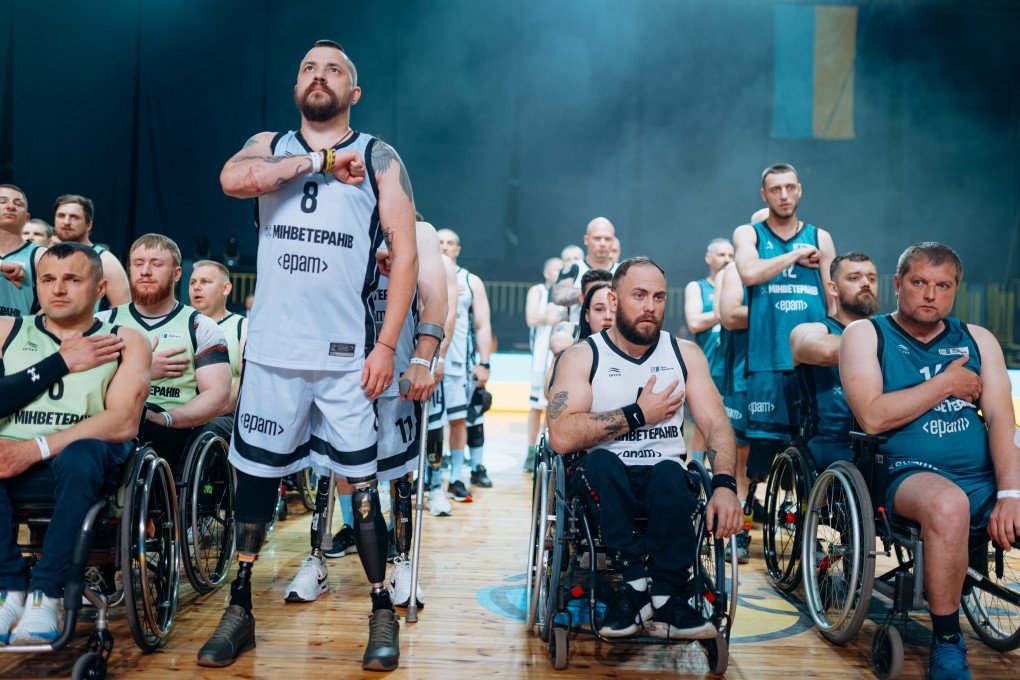
Of course, the competitions are entertaining, but adaptive sports’ value extends far beyond recreation.
“We want to use ourselves as an example that nothing is impossible,” Prytula says. “A lot depends on you and your desire not to give up and continue living. In many ways, my life is better now than it was before, with legs.” He understands this may sound wild to some people, but many veterans with limb loss agree.
Vilni Voyiny was founded by veterans who previously competed in the Invictus Games and are active in other adaptive sports as well—such as (standing) archery and jiu-jitsu in Prytula’s case.
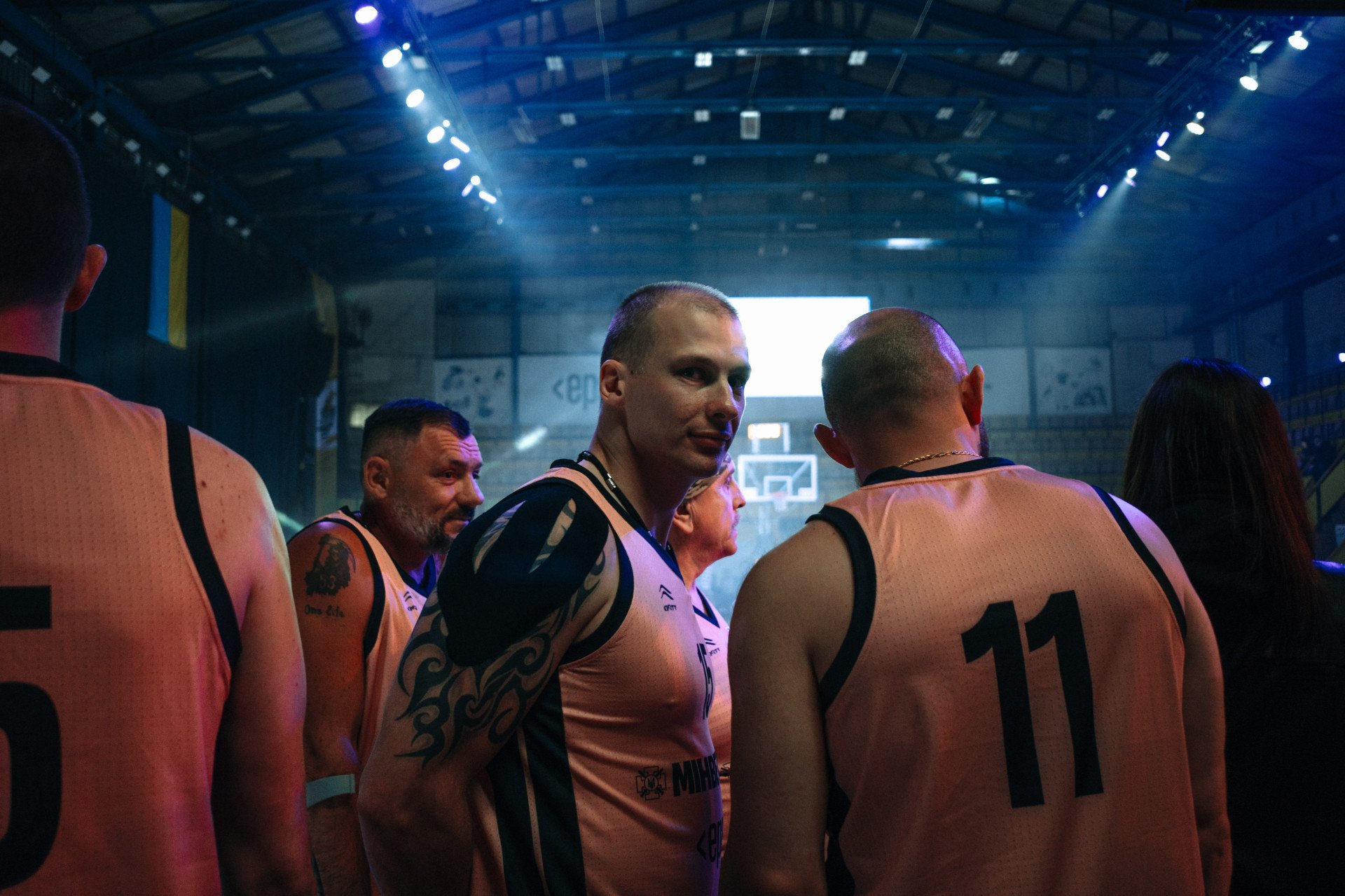
Adaptive sports: A pathway to dignity & inclusion
When asked about what accessibility means, particularly on a societal level outside of infrastructural needs, Prytula emphasized that, at its core, accessibility is about being a decent person and creating an environment where accessibility comes without a second thought.
“If you’re simply normal people who respect one another, this question wouldn’t even exist,” he says. “The problem isn’t just about the absence of ramps or handrails, which I use. It’s about accountability.”
A person who is a business owner and works with people should automatically be thinking about the fact that all people are different, Prytula notes. “Every person deserves the opportunity to receive services.”
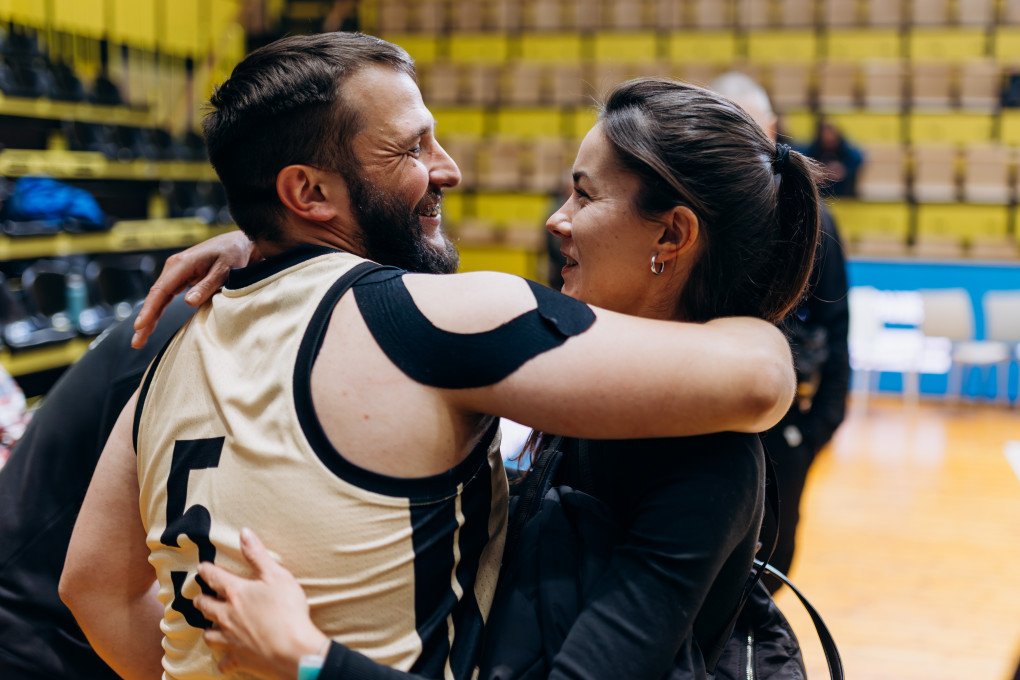
In an ideal world, Prytula believes people wouldn’t be divided along identity markers such as gender and ability. Ultimately, accessibility is about each person being able to engage and participate in civic life comfortably and independently. Parallel to the development of adaptive sports, Prytula shares that he’d also like to see more emphasis on educational and other social opportunities for veterans.
For para-athlete Oleksandr Tolochenko, this tournament wasn’t his first—the player from Tytanovi (named after Ukraine’s Tytanovi rehabilitation center) previously competed in the 2024 Men’s European Championship in Madrid, Spain, bringing home three bronze medals and a silver.
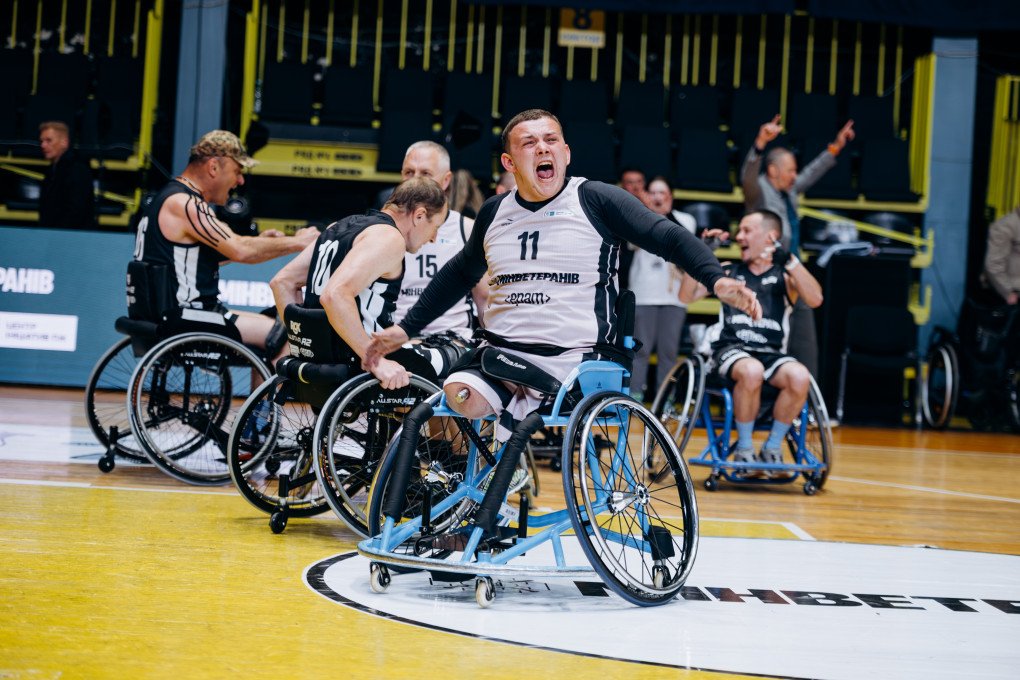
Prior to Russia’s full-scale invasion, he worked in construction in Poland, but returned and joined Aidar, an assault battalion of the Ukrainian Ground Forces. Tolochenko lost both legs above the knee from an anti-personnel mine while carrying out an offensive against Russian positions in Klishchiivka, Donetsk region, in May 2023. The attack happened just 70 meters from their trench and resulted in the immediate loss of the left leg, significant trauma to the right leg, an 8-day coma, and a clinical death. Miraculously, despite this and losing his second leg, Tolochenko survived. Today, he says, “No matter the injury, God gives us a second chance at life and we need to live it fully.”
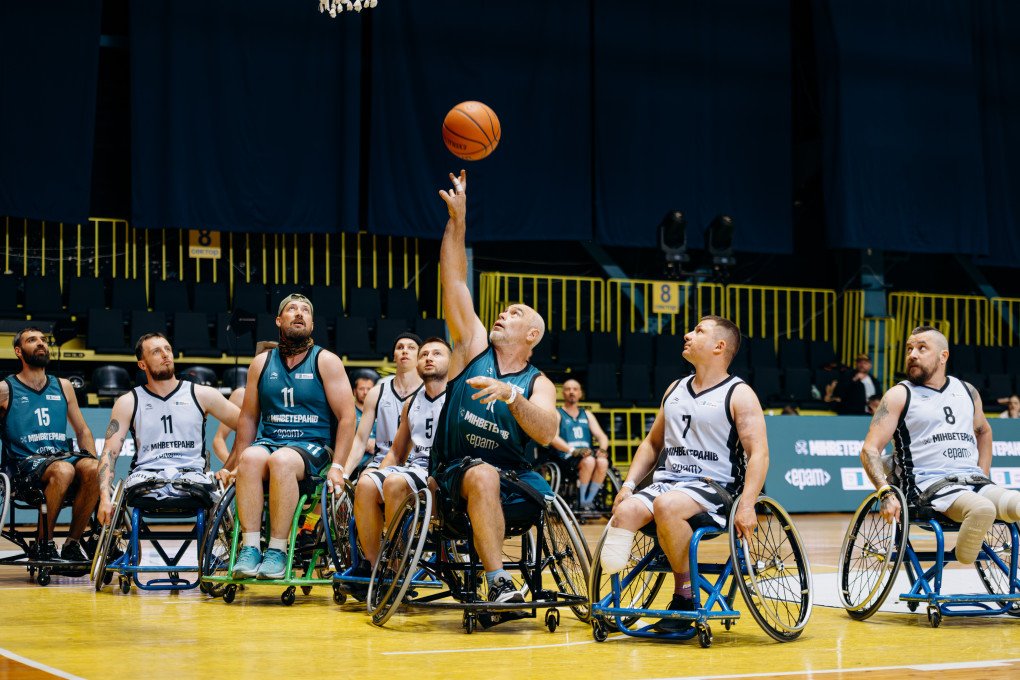
His advice to others embarking on the path of recovery after limb loss is to find oneself after the injury.
“Find yourself in some form of sport. Sport helps distract from the injury. It helped me because I had a goal to compete in the international championship,” he says, referring to the Madrid championship. “Tournaments are really great. You compete with people just like you. It was really nice for me to be able to win some medals.”
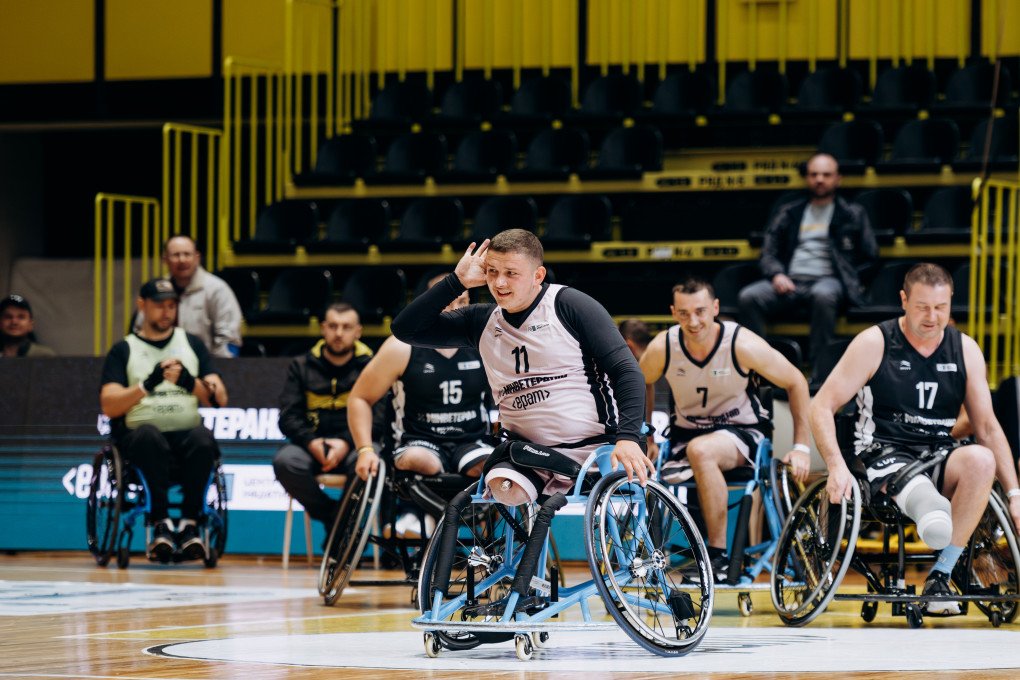
On accessibility, Oleksandr says the concept begins at home—children need to be taught that there are different people, with different injuries and different types of amputations. Significant structural improvements are also necessary so that people with mobility aids can use public transportation and public spaces independently, without assistance.
The tournament is a blueprint for the barrier-free society that disability advocates strive for.
Contrary to popular belief, anyone of any ability can play wheelchair basketball. Ukrainian blogger, comedian, and social media personality Danil Povar, who is able-bodied, took part in the games, noting, “This is a full-fledged game, I can’t say that it’s a game with limitations.” Povar continues that wheelchair basketball is its own sport and that players who are experienced in the classic version would struggle to compete here.
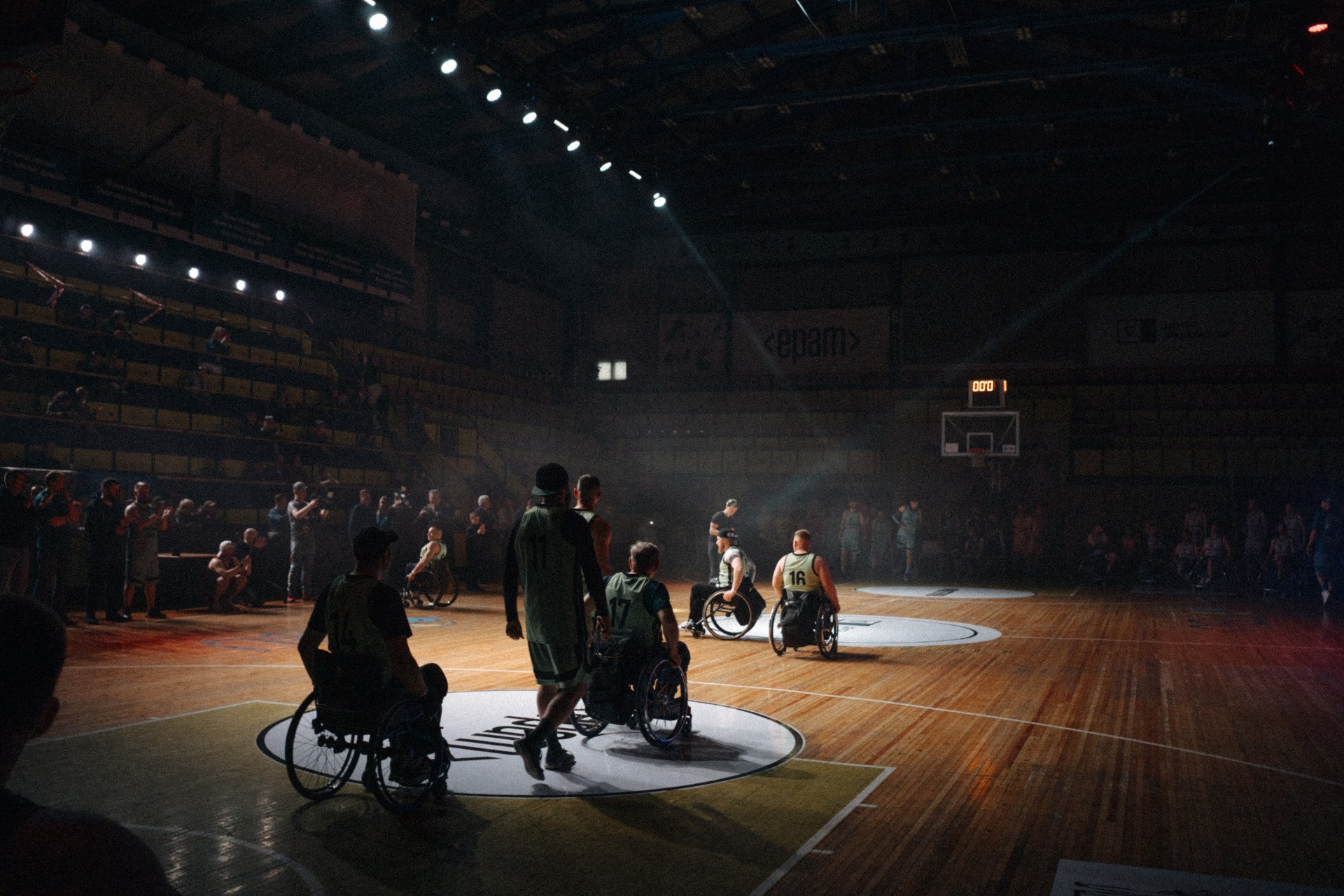
As the sun begins to set outside, the Bratany (Brothers) score the winning 2 points in overtime, becoming the champions of the first All-Ukrainian Wheelchair Basketball Tournament for veterans with a 14-12 victory. A dunk show with able-bodied players, award ceremony, speech by CBA head Taras Chmut, and performances by Ukrainian rapper Artem Loik and Ukrainian band Krykhitka close out the night to hundreds of spectators, players, their families and friends in what looks like a pre-war festival in the European capital—a powerful visual of Ukrainian veterans’ resilience, adaptability and bright future ahead.
@united24media.com A dunk show at the All-Ukrainian Wheelchair Basketball Tournament for veterans, featuring a player from the team “Bratany.” Video: Maria Kuchapska
♬ original sound - united24media.com
-050b2b5554ed561c87f909a001f905b9.png)
-8fda54010650befcec1e2c4d694c566b.jpg)
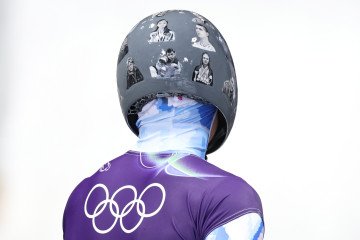

-6ead6a9dd508115a5d69759e48e3cad1.jpg)
-29a1a43aba23f9bb779a1ac8b98d2121.jpeg)
-7f50738271c122a9b5e663cb80703dd6.jpg)

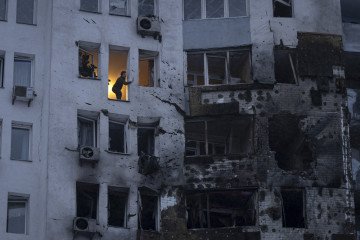
-554f0711f15a880af68b2550a739eee4.jpg)